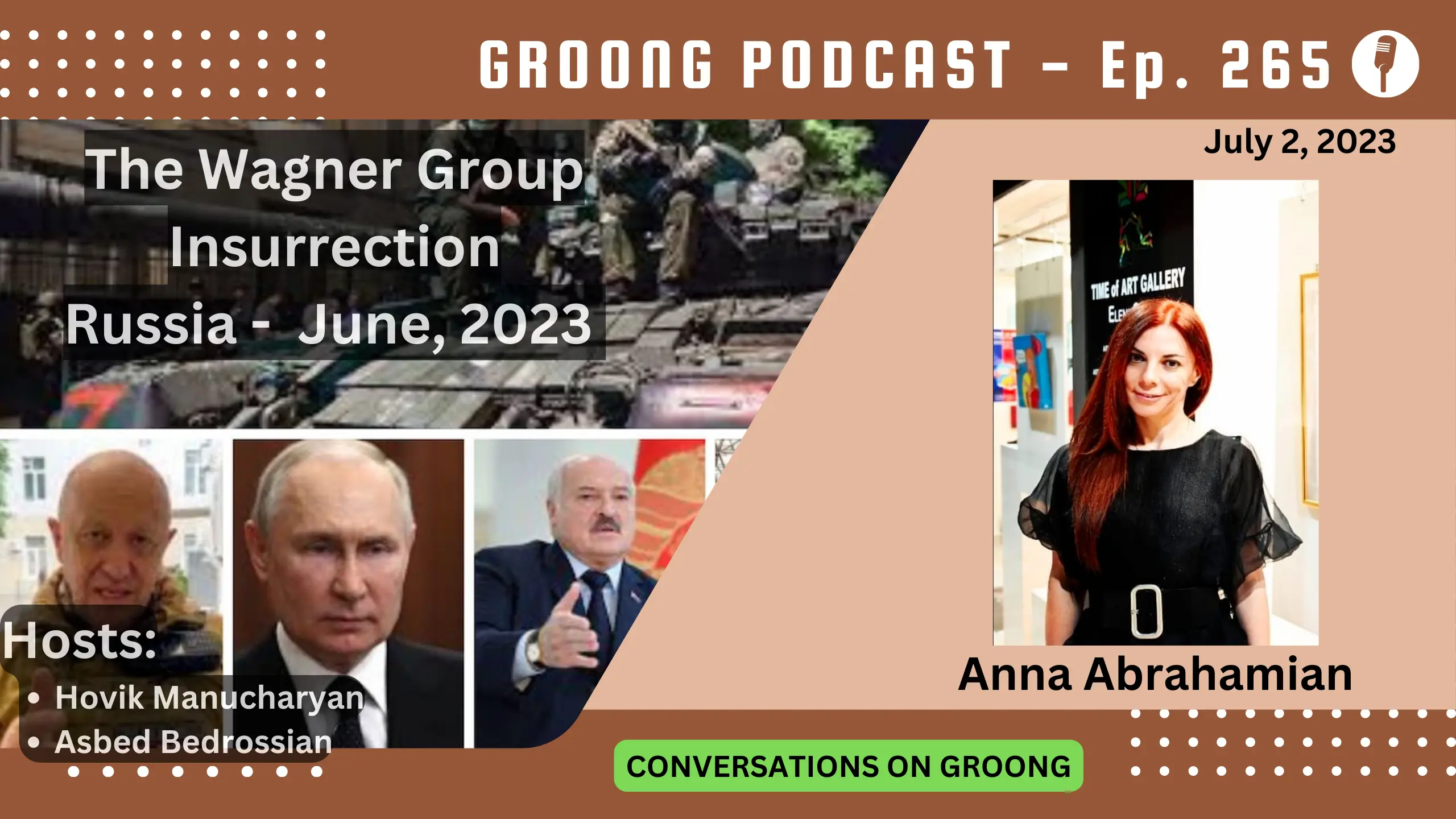
Guest:
Topics:
- The Wagner Group
- Special Ops in Russia
- Over at The Ministry of Defense
- A White Russian
- On The Western Front
- Are We Done Yet?
- Parallels with 2016 in Armenia?
- PMCs in Armenia?
Episode 265 | Recorded: June 30, 2023
Show Notes
Wagner’s Russian Opera
The Wagner Group
One of the most riveting events this past weekend was the unexpected bout that Russia had with domestic instability. Tensions between a close, perhaps now former, ally of president Putin, Yevgeny Prigozhin, and the military leadership of Russia boiled to an all out conflict, which Putin called a “mutiny” and “treason”.
Prigozhin is one of the public faces behind a private army called the Wagner Group, which has been instrumental not only in the current war in Ukraine, but also acts as a de-facto, yet unofficial military arm of Russian foreign politics in far away places like Africa, Middle East, etc.
Within 24-48 hours Putin had dealt with the conflict, which is pretty amazing by itself.
Questions:
- What are the origins of the Wagner Group?
- Who is Yevgeny Prigozhin, and is he in charge of Wagner?
- We’ve heard of other names connected with Wagner, including Lt. Col. Dmitry Utkin, Col. Konstantin Pikalov, Col. Andrei Troshev, Col. Gen. Mikhail Mizintsev but those names aren’t normally mentioned in press.
- How does the Kremlin use the Wagner Group?
- How is it funded?
Special Ops in Russia
The Wagner Group became engaged in the war in Ukraine fairly early on, and was most famously instrumental in conquering the city of Bakhmut, albeit paying a high price in terms of lost manpower. However, there’s been growing tension between Prigozhin and the Russian defense ministry. Prigozhin has accused the defense leadership of incompetence, bungling the war, and lying to the “Russian people”, which we figured he meant as lying to Putin, to cover it up. Additionally, he has routinely accused the defense ministry for not supplying the Wagner Group with necessary arms to carry out their mission, and essentially throwing his forces to the wolves, defenseless.
The events culminated with Prigozhin announcing a March on Moscow on June 23, in which Prigozhin claimed that tens of thousands of Wagner troops took part in. There were reports of fighting with the regular army and apparently there were deaths on both sides as well as evidence of downed equipment such as helicopters.
Questions:
- Can you describe what happened in Russia almost two weeks ago?
- Reports vary widely from source to source.
- How far did The Wagner Group go, or did they intend to go? What was their intent?
Over at the Ministry of Defense
Defense minister Sergei Shoigu and the Chief of the Generals Staff Valery Gerasimov appear to be allies. Gerasimov replaced General Sergei Surovikin, who then assumed command of the operations in Ukraine. Only in the past day, Surovikin has been detained. There are reports that Surovikin had advance knowledge of the Wagner insurrection.
Questions:
- Who are the different camps in the Russian military leadership?
- Are Shoigu and Gerasimov on the same page as Putin? Who does Putin talk to, or rely on, regarding the war in Ukraine?
- Is Surovikin’s detention the start of perhaps more purges in the defense ministry leadership ranks?
- Does Putin trust his military leadership, after these Wagner events?
- Prigozhin is reported to be an ally of Aleksey Dyumin, the governor of Tula oblast who has the military rank of general and has experience leading the Russian special forces, and is credited with the operation to annex Crimea. What is Dumin’s role in all of this?
- Some claim that this entire operation was a psyop, do you believe that? How so, or not so?
A White Russian
Reportedly, Belarus president Alexander Lukashenko, who personally knows Prigozhin, had a lot to do with brokering the deal between him and Putin. Across the various sources we’ve seen, Prigozhin never directly accused or mentioned Putin himself, so it appears that he was careful to not burn certain bridges there.
As part of the deal, Prigozhin went to Belarus. The Wagner Group fighters were essentially amnestied and to be absorbed in the Russian defense forces.
Questions:
- Did the two sides need a face-saving option to back down?
- Can you discuss Lukashenko’s role here, and how he provided value to both sides?
- With Prigozhin moving to Belarus, does the Wagner Group essentially move to Russia?
- Some have speculated it is being relocated to attack Ukraine from the North.
On The Western Front
The west was careful to not comment while events in Russia were unfolding, but since the apparent end of events and the striking of the deal, mostly the west has tried to portray Putin as isolated and weakened. On the other hand, some also say that despite everything Putin is still the preferred leader in Russia to hold the reins of the world’s largest nuclear arsenal, because if not him, then who?
Questions:
- Some have suggested that Prigozhin may have been bought out by the west. Do you see any traces of western involvement in these events?
Are We Done Yet?
With Prigozhin’s departure for Belarus and the dissolution of the Wagner Group mercenary army, it seems that for now this act of Wagner’s Russian Opera may be over.
Questions:
- Is it really?
- Where have the Wagner events left Putin? Is he weakened, or strengthened?
- Are Russia’s, and Putin’s, domestic troubles at an end?
- What can we expect from here on?
Comparison with 2016 in Armenia?
Earlier you said that “everyone benefited from this”, including Putin.
Questions:
- Isn’t this appeasement? One of the things that Serzh Sargsyan is criticized for is Was this Putin’s “Sasna Tsrer” moment?
Use of PMCs in Armenia?
You mentioned that the use of private military contractors (PMC) is now the norm so to say. Some call them mercenaries. You mentioned that the US popularized their use. France has its “foreign legion”. Turkey makes use of Syrian fighters. Even the United Nations makes use of PMCs.
Yet, the line between PMCs and “mercenaries” is thin. And there is an international convention called the UN “Mercenary Convention” which prohibits the use of mercenaries.
And Armenia has signed and ratified this convention right during the 44 day war.
Questions:
- Does this mean that Armenia has signed away the ability to use PMCs in the future?
Wrap-up
That concludes this Conversations On Groong episode**. **As always we invite your feedback, Thanks to Laura Osborn for the music on our podcasts. Don’t forget to subscribe to us on YouTube, Twitter, and Facebook.
Guests

Anna Abrahamian
Anna Abrahamian is a geopolitical analyst who splits her time between Moscow and Athens. Having obtained training in international law, Anna has worked in such noteworthy institutions as the Defense Analyses Institute in Athens as well as the Crisis Group in Brussels. Today, Anna provides her analysis on geopolitics and Armenian politics to her followers on social media and you can find her on various platforms, including Facebook, Telegram, and Youtube.
Hosts

Hovik Manucharyan
Hovik Manucharyan is an information security engineer who moved from Seattle to Armenia in 2022. He co-founded the ANN/Groong podcast in 2020 and has been a contributor to Groong News since the late 1990s.
Disclaimer: The views expressed by Hovik Manucharyan on the ANN/Groong podcast are his own and do not necessarily reflect the opinions of his employer or any other organization.

Asbed Bedrossian
Asbed Bedrossian is an IT professional, and for years oversaw the central IT enterprise infrastructure and services at USC. His decades of experience spanned across IT strategy, enterprise architecture, infrastructure, cybersecurity, enterprise applications, data center operations, high performance computing, ITSM, ITPM, and more.
Asbed founded the Armenian News Network Groong circa 1989/1990, and co-founded the ANN/Groong podcast in 2020.